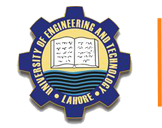Group: 2014-FYP-30
|
||||||||||||
Facebook Page
Objectives
Our Vision
To ensure understanding and application of engineering fundamentals to address social needs.
Our Mission
To become a center of excellence in knowledge creation and dissemination by inculcating analysis and design skills in electrical engineering students.






